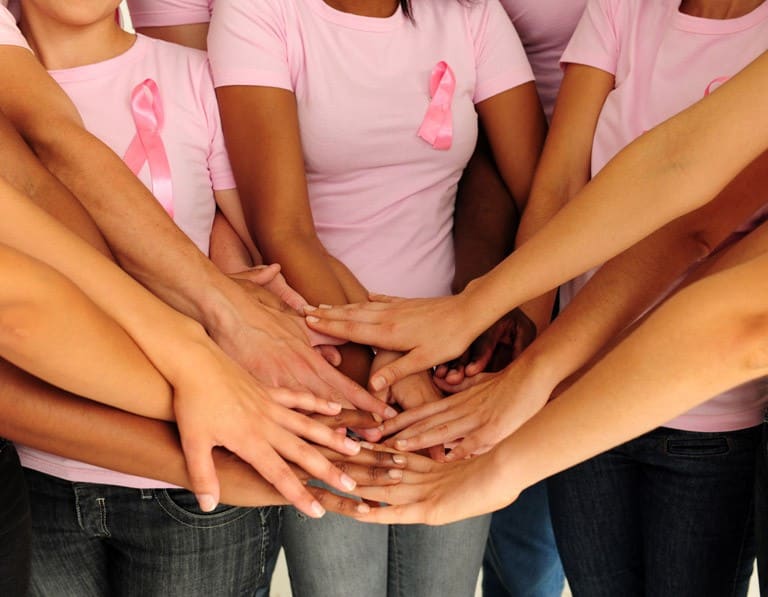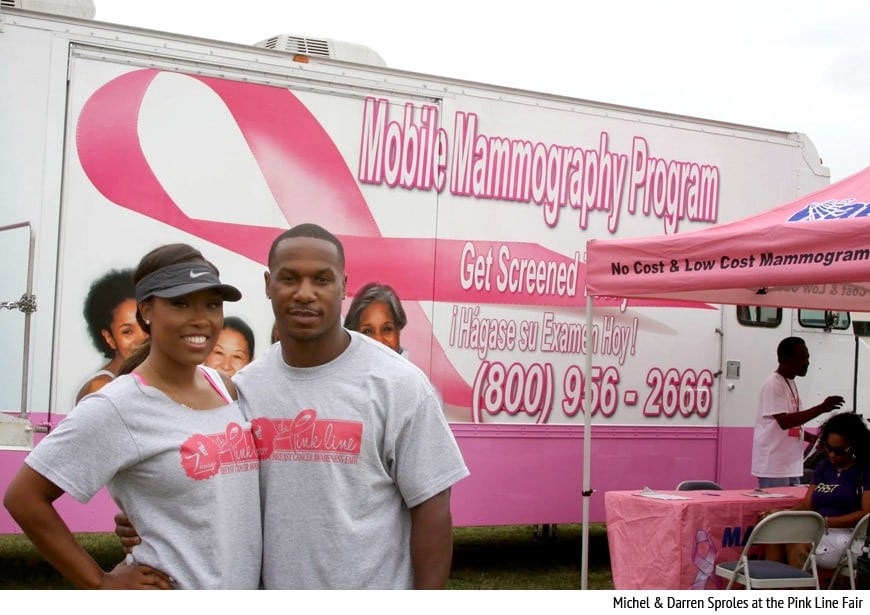The Pink Promise Zone
Little pieces of pink paper cover a white arch. To some, it may just seem like another mural in the mall. But, it’s way more than that. The little pieces of paper mark a promise – a promise to help advocate for better breast healthcare. Step into the pink promise zone.
One in eight women in the United States will be diagnosed with breast cancer in their lifetime. It’s a disease that has no limitations. Age, gender, or location does not make a person barred from its wrath. Being female, and growing older, however, are the two greatest risk factors.
Susan G. Komen for the Cure
Susan Goodman Komen was diagnosed with breast cancer at the age of 33 and lost her battle at the age of 36 in 1980. Komen’s younger sister Nancy Brinker promised her that she would do everything in her power to end breast cancer.
That promise became Susan G. Komen for the Cure, which has launched a global breast cancer movement. Today, Komen for the Cure is the world’s largest grassroots network of breast cancer survivors, and activists that are fighting to save lives, empower people, and make sure patients are receiving quality care. Since their start, $1.5 billion has been invested to fulfill that promise making this network the largest source of nonprofit funds dedicated to the fight against breast cancer in the world.
Mayfair Mall in association with Susan G. Komen Southeast Wisconsin is hosting a series of events during the month of October to help increase awareness about breast cancer health. The Wauwatosa mall has transformed into the “Pink Promise Zone”. Sponsored by the Cancer Treatment Centers of America, this exhibit gives people the chance to pledge and take steps towards breast health.
Kristi Lasch stopped by the exhibit on her way to work to sign the promise card. She has seen firsthand the effects of this disease. “Well I worked at a hospital for five years so I saw a lot of people get affected by breast cancer and different types of cancers,” says Lasch. “And, I think it’s just important to get your screenings done to prevent so much from happening.”
Breast cancer affects more than just the patient. Friends, family, and co-workers all need support too. “I’ve known a few people close to me that have been affected by breast cancer. It’s just a good thing that there is awareness of it,” says Lasch.
Just knowing how many people are affected, and the facts surrounding the issue gives enough reason for some people to want to take action. That was the case for Crystal Garrison. She took a few minutes out of her day to step into the “Pink Promise Zone”. Even though she personally does not know anyone affected by breast cancer, she has taken some proactive steps in her life.
“I hope they find a cure for it,” says Garrison. “I’m not old enough to get an exam yet. But I have gone to just check for lumps at the clinic”.
Early detection and effective treatment for breast cancer have been shown to improve survival.
Self Awareness
Adrian Jones, a community educator at Planned Parenthood of Wisconsin believes it is important to have self-awareness when it comes to your own personal health.
“As a woman in my early 30s, I recognize that African-American women are too often diagnosed late and have more aggressive forms of breast cancer,” says Jones. “There is great importance in knowing your family’s health history. There is this notion that as Black women, we should put our health to the back burner in order to better serve our families and simply pray about it and dismiss it. Often, living in shame and anxiety about the things we experience when it comes to our health. I want to break that cycle. ”
When it comes to knowing your own personal health, it is important to know what is normal for you and see a healthcare provider if there are any abnormal changes. It is also important to learn about your family health history and talk to a doctor about your personal risk of breast cancer.
Jones says she has learned to take note about anything and everything that happens with her body whether it is good or bad.
“At the end of the day I have to be my own health advocate,” Jones says. “Although I only have one case of breast cancer in my family, I make it a point to get a yearly manual breast exam. My doctor will sometimes tell me I don’t need it. I simply respond with, I want to, just to be on the safe side. Early detection is so crucial and beneficial to cutting this cancer off at the pass.”
Jones believes there needs to be more literacy friendly and accessible education but believes there are communities in the United States that are deeply involved with promoting breast health.
The Pink Promise Zone
There are more than three million breast cancer survivors in the United States today. Creating healthy lifestyle choices can reduce the risk of breast cancer.
“A promise card is just saying that I’m willing to get myself checked, I’m willing to tell others about it, and I’m willing to take a stand against fighting for it,” says Lasch.
There are many ways to take action that involve fundraising, donating, or hosting a Passionately Pink event. Even volunteering time has helped create a big impact. Most of all, there is more hope. In 1980, the five-year relative survival rate for women diagnosed with early stage breast cancer was about 74 percent. Now, it’s at a 99 percent. By making the pink promise, you are standing up for your health and dedicating your life to fighting off cancer.
“You gain strength, courage, and confidence by every experience in which you really stop to look fear in the face.”
-Eleanor Roosevelt











